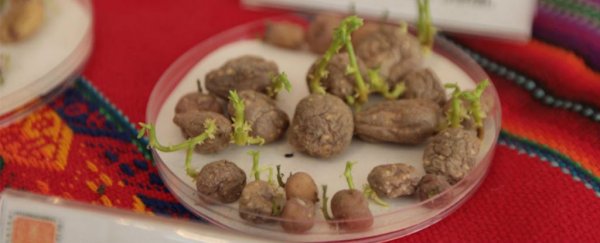If you've been to see the recent Ridley Scott film The Martian, you'll know that growing food on the Red Planet isn't exactly straightforward: the atmosphere is 95 percent carbon dioxide and there's precious little evidence to suggest there's enough water there to support life. Now a team made up of researchers from the International Potato Centre (CIP) and NASA is attempting to grow potatoes in Mars-like conditions.
The initiative has two main aims: one, to test if it's actually possible to grow food on the surface of the Red Planet once we finally get there. Two, to develop methods for growing potatoes here on Earth in very inhospitable conditions - if that particular magic formula can be cracked, it has the potential to save millions of lives on our own planet.
"How better to learn about climate change than by growing crops on a planet that died 2 billion years ago?" said Joel Ranck from CIP. "We need people to understand that if we can grow potatoes in extreme conditions like those on Mars, we can save lives on Earth."
The scientists working on the project are going to simulate Martian conditions as best they can in a laboratory using Peruvian desert soil and an artificial atmosphere that's rich in carbon dioxide. The CO2 will actually help the potatoes grow faster, and that could be crucial in providing food for the first settlers on Mars.
For now though, the focus is on the 842 million people around the world affected by famine. With malnutrition and poverty on the rise, and global warming contributing to poor soil quality and the spread of pests and diseases, being able to produce a crop that can flourish in difficult conditions could be hugely important: potatoes are resilient, highly nutritious and excellent sources of vitamin C, iron and zinc.
Teams from labs in California, Lima and Dubai are all going to be working together on the endeavour, and it's hoped that their research can help bring a greater awareness of how the humble potato can help solve the problems of global hunger. When we set off for Mars sometime after 2030, the research will become even more valuable.
"The extraordinary efforts of the team have set the bar for extraterrestrial farming," commented NASA's Chris McKay. "The idea of growing food for human colonies in space could be a reality very soon."
"We see the science, educational, and humanitarian goals as being intertwined," added his colleague Melissa Guzman. "In the process of working together toward establishing a community on Mars, our students will also be establishing a community on Earth."
